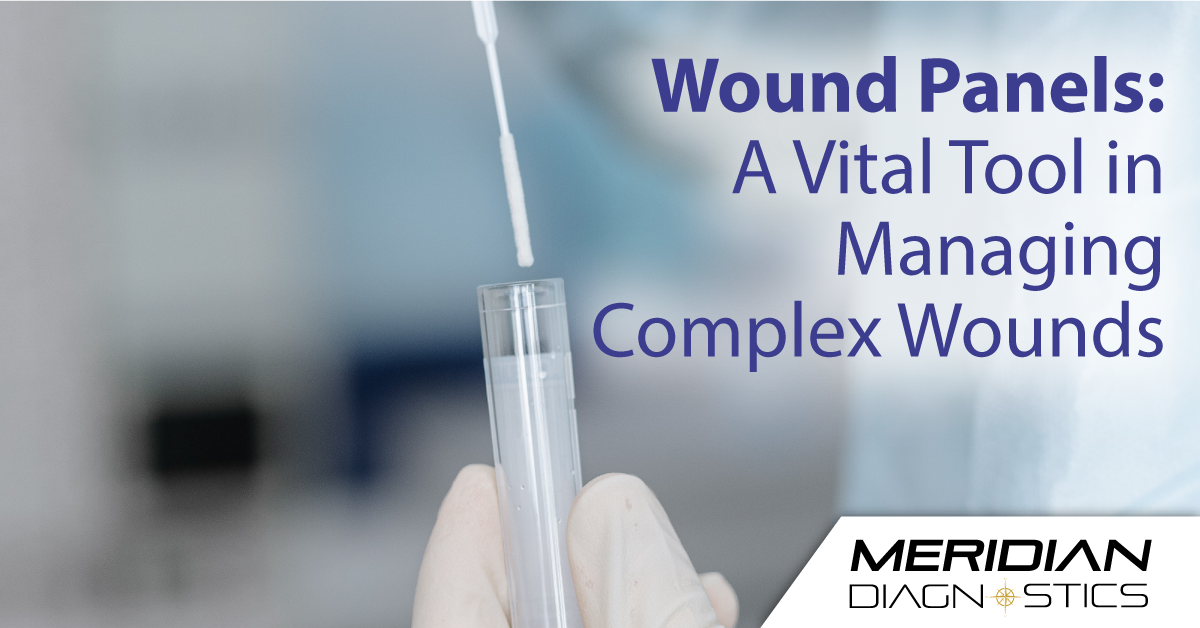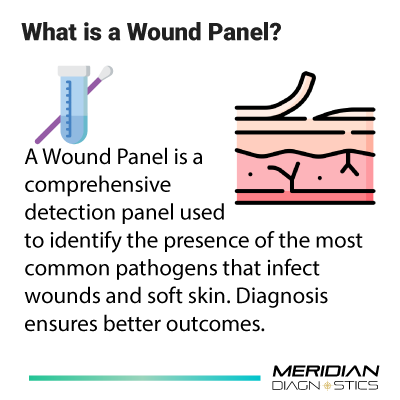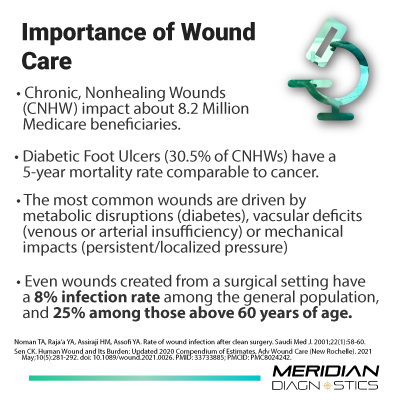
As a clinical laboratory focused on providing high-quality diagnostic testing services, Meridian understands the challenges healthcare providers face when managing complex wounds. These wounds, which are often slow to heal and have multiple contributing factors, can be difficult to treat and require a specialized approach. One tool that has become increasingly important in managing complex wounds is the wound panel.
What are Wound Panels?
 Complex wounds, such as those that result from diabetic foot ulcers, venous stasis ulcers, or pressure injuries, can be a significant burden for patients and healthcare providers. These wounds are often slow to heal, can become infected easily, and may require prolonged hospitalization or multiple surgeries. Proper management of complex wounds is critical to ensure optimal outcomes for patients and to prevent further complications. Wound panels, which are comprehensive diagnostic tests that evaluate various aspects of a wound, have become a valuable tool in the management of complex wounds.
Complex wounds, such as those that result from diabetic foot ulcers, venous stasis ulcers, or pressure injuries, can be a significant burden for patients and healthcare providers. These wounds are often slow to heal, can become infected easily, and may require prolonged hospitalization or multiple surgeries. Proper management of complex wounds is critical to ensure optimal outcomes for patients and to prevent further complications. Wound panels, which are comprehensive diagnostic tests that evaluate various aspects of a wound, have become a valuable tool in the management of complex wounds.
Skin infections can be difficult to detect in the elderly due to changes in aging skin. These changes can include rough, dry, or cracked skin, transparent, thin skin, loose skin and skin folds, and benign growths. In addition, those with an altered immune status or poor circulation may be at higher risk for skin infections. Identifying skin infections in high-risk populations is crucial, as these individuals may have a more severe reaction to an infection.
According to the American Academy of Family Physicians, common symptoms of skin infections such as swelling, pain, and redness may look and feel completely different for adults over the age of 65, those with comorbid conditions, and people with an altered immune status. Symptoms of a skin infection in the elderly or high-risk populations may include rashes, pus, itching, fever, and hot incision sites. It is important for individuals in these populations to closely monitor any changes in their skin and seek medical attention if they suspect a skin infection. A wound panel diagnostic test can also be a useful tool in detecting and managing skin infections in these vulnerable populations.
Importance of Wound Care
 Improper wound care can lead to serious complications, especially for seniors, whose immune systems are often weakened. The risks associated with untreated wounds can range from mild infections to life-threatening conditions such as septicemia. Therefore, it is crucial to understand the various aspects of proper wound care, particularly those prevalent in senior living communities and post-acute care.
Improper wound care can lead to serious complications, especially for seniors, whose immune systems are often weakened. The risks associated with untreated wounds can range from mild infections to life-threatening conditions such as septicemia. Therefore, it is crucial to understand the various aspects of proper wound care, particularly those prevalent in senior living communities and post-acute care.
A holistic approach to wound care is critical, especially when dealing with older adults in facilities such as assisted living and memory care. The skin is the body's largest barrier against infection from external pathogens. According to NCBI, a basic understanding of the healing process, the most common types of ulcers, and the available dressing options is necessary for caring for senior patients. Understanding the different types of wounds that older adults may have and the different treatment options available for each can significantly improve the ability to prevent infection from an open wound.
The progress of wound care depends on the stage at which treatment begins. Early intervention is crucial in preventing infection, and seniors must take the necessary steps to prevent the wound from becoming chronic. If the wound progresses to a chronic stage, professional medical attention is essential to prevent complications and potential amputations. Seniors living in assisted living communities should have their skin monitored by a full staff of registered nurses and attentive caregivers. These professionals can ensure that wounds are spotted quickly and handled appropriately, preventing further complications.
Proper wound care is essential for seniors in assisted living communities and post-acute care. Understanding the various types of wounds, treatment options, and the importance of early intervention can significantly reduce the risk of complications and promote healing. Assisted living communities must take a holistic approach to wound care and provide seniors with a team of trained professionals to ensure their health and well-being.
Components of a Wound Panel Test
Wound care panels typically include a combination of microbiology, pathology, and molecular tests that evaluate the wound bed, surrounding tissue, and systemic factors that may be impeding the healing process. Some common components of a wound panel may include:
- Bacterial culture and susceptibility testing to identify the presence of bacteria and determine the most effective antibiotic treatment.
- Fungal culture and susceptibility testing to identify the presence of fungi and determine the most effective antifungal treatment.
- Histopathology to evaluate the tissue sample for signs of inflammation, necrosis, or malignancy.
- Molecular testing, such as polymerase chain reaction (PCR), to identify the presence of specific pathogens or genetic markers associated with poor wound healing.
This information can be used to guide antibiotic or antifungal therapy, ensuring that patients receive the most effective treatment possible. In addition, wound panels can help healthcare providers identify antibiotic-resistant bacteria or fungi, which may require alternative treatment options.
Who should consider using a wound panel?
Wound panels are particularly useful for healthcare providers who are managing complex wounds, such as diabetic foot ulcers, venous stasis ulcers, or pressure injuries. These wounds often have multiple contributing factors, such as infection, inflammation, and poor circulation, that can be difficult to identify and treat without a comprehensive diagnostic evaluation.
However, wound panels may also be useful in other clinical scenarios, such as when a wound is not healing as expected, or when a patient has a history of chronic wounds. In these cases, a wound panel can help healthcare providers identify any underlying factors that may be contributing to poor wound healing and develop a more effective treatment plan.
Overall, wound panels are a valuable tool in the management of complex wounds and can provide healthcare providers with important information about the factors contributing to poor wound healing. By using a wound panel, healthcare providers can develop more effective treatment plans and improve outcomes for their patients.
How to Order Your Wound Care Test Panel
Wound panels are one of the services Meridian offers. Healthcare providers can contact a clinical laboratory like Meridian to coordinate testing services and order testing supplies. Once the kit is received, the provider can collect a sample from the wound bed using the swabs provided in the kit. The sample can then be sent to the laboratory for analysis.
At Meridian, we offer a variety of wound panel test services, including those that test for bacteria, fungi, and viruses commonly found in wound infections. Our laboratory uses state-of-the-art diagnostic technology to provide accurate and timely results to healthcare providers, allowing them to make informed decisions about the most appropriate treatment for their patients' wounds.
At Meridian, we understand the importance of wound panels in the management of complex wounds. That's why we offer a variety of wound panel testing services and use the latest molecular PCR diagnostic technology to provide accurate and timely results to healthcare providers. With our expertise in antibiotic and antifungal treatments, healthcare providers can have confidence in their treatment plans and improve outcomes for their patients with complex wounds. Email info@meridiandiaglabs.com for more information about our services and enrollment.